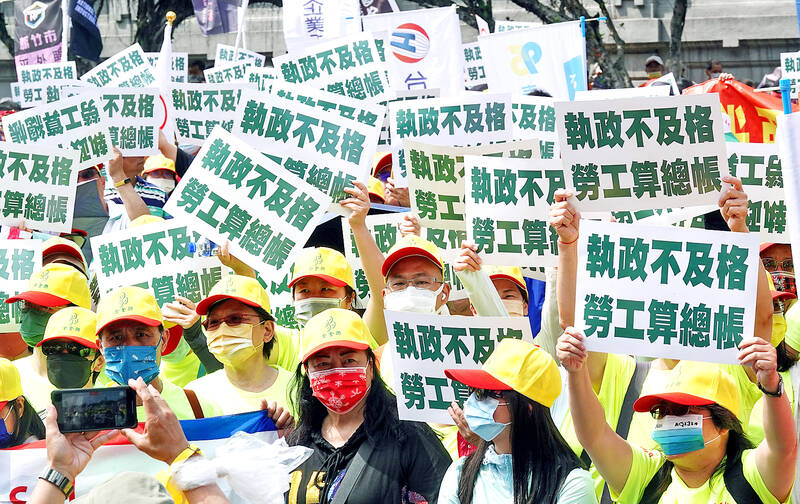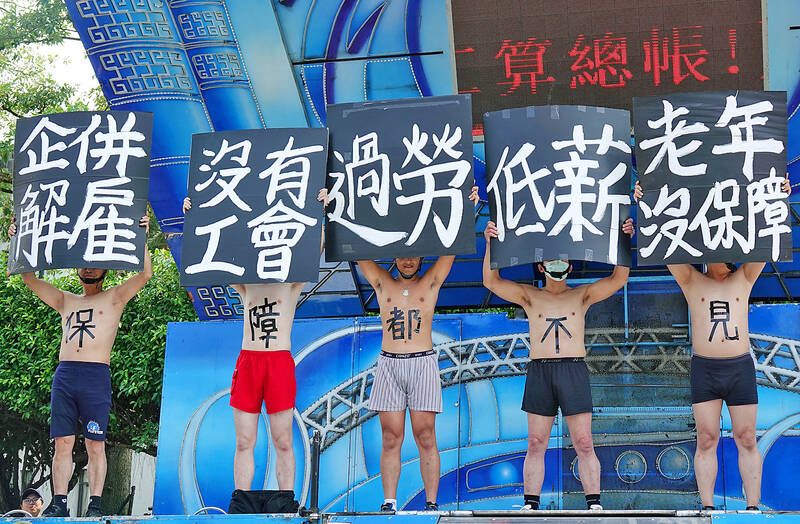Workers and their supporters yesterday took to the streets of Taipei to mark International Workers’ Day with demands for the government to offer better labor welfare.
While passing Democratic Progressive Party’s (DPP) headquarters in Taipei, the protesters tore hand-held signs that resembled election ballots, protesting the government’s “failed” labor policies.
Event organizer May 1 Action Alliance yesterday said about 5,000 people took part in the rally.

Photo: CNA
The alliance demanded that the government address the failures of its two touted labor amendments, which were to address low wages and labor pension reforms, and protested the exploitation of medical personnel during the COVID-19 pandemic.
The protesters demanded that the government reinstitute seven national holidays that were rescinded in a 2016 labor reform.
The reform sparked protests from workers and labor groups at the time, as workers would not be eligible for additional pay if scheduled to work on those days, amounting to a pay cut.

Photo: CNA
Alliance leader and Taiwan Confederation of Trade Unions president Chiang Chien-hsing (江健興) said that average wages for workers were decreasing each year due to employers being “unwilling to share the fruits of success” with those who made profits possible.
Despite increases to the minimum wage for seven years in a row, the rate pales in comparison the rise of commodity prices, Chiang said.
Taiwan ranks fifth on the international scale of working hours, and the government should endeavor to lower working hours and increase wages, he said, adding that long hours and low wages are part of the reason Taiwanese are becoming more reluctant to have children.
Chiang said the government must draft legislation to ensure that the labor insurance fund remains healthy.
The government must also lower thresholds for union formation to help protect labor rights, he added.
The Ministry of Labor yesterday said in response that the 47 percent rise in the minimum wage over seven years — from NT$120 (US$3.90) in 2016 to NT$176 this year — demonstrates the government’s commitment to protecting labor rights.
As of 2021, the average hours worked in Taiwan stood at 41.6 hours, compared with 43.9 hours in South Korea and 42.5 hours in Japan, the ministry said.
However, the government is continuing to make efforts to better help workers balance their jobs and family needs through policy adjustments, it added.
The NT$16 billion it is scheduled to invest over the next four years should help 800,000 young people secure jobs, it said, adding that amendments to the Labor Standards Act (勞動基準法) are planned to provide better working conditions and quality of life.
Separately, President Tsai Ing-wen (蔡英文) marked International Workers’ Day by thanking essential workers for safeguarding the people of Taiwan throughout the COVID-19 pandemic.
Tsai on social media recognized the efforts of workers from across society for collectively maintaining economic and social stability over what she described as a challenging three years.
Tsai said that it is imperative for the government to now provide more consideration and care for workers, particularly given an adverse outlook for the global economy in the year ahead.
The government since 2016 has been making concerted efforts to slash workers’ economic burdens with measures to increase the minimum wage, cut taxes and implement diverse social welfare programs, Tsai said.

Trips for more than 100,000 international and domestic air travelers could be disrupted as China launches a military exercise around Taiwan today, Taiwan’s Civil Aviation Administration (CAA) said yesterday. The exercise could affect nearly 900 flights scheduled to enter the Taipei Flight Information Region (FIR) during the exercise window, it added. A notice issued by the Chinese Civil Aviation Administration showed there would be seven temporary zones around the Taiwan Strait which would be used for live-fire exercises, lasting from 8am to 6pm today. All aircraft are prohibited from entering during exercise, it says. Taipei FIR has 14 international air routes and

The Ministry of National Defense (MND) today released images of the military tracking China’s People's Liberation Army (PLA) movements during the latest round of Chinese drills around Taiwan. The PLA began "Justice Mission 2025" drills today, carrying out live-fire drills, simulated strikes on land and maritime targets, and exercises to blockade the nation's main ports. The exercises are to continue tomorrow, with the PLA announcing sea and air space restrictions for five zones around Taiwan for 10 hours starting from 8:30am. The ministry today released images showing a Chinese J-16 fighter jet tracked by a F-16V Block 20 jet and the

City buses in Taipei and New Taipei City, as well as the Taipei MRT, would on Saturday begin accepting QR code payments from five electronic payment providers, the Taipei Department of Transportation said yesterday. The new option would allow passengers to use the “transportation QR code” feature from EasyWallet, iPass Money, iCash Pay, Jkopay or PXPay Plus. Passengers should open their preferred electronic payment app, select the “transportation code” — not the regular payment code — unlock it, and scan the code at ticket readers or gates, General Planning Division Director-General Liu Kuo-chu (劉國著) said. People should move through the

Snow fell on Yushan (Jade Mountain, 玉山) yesterday morning as a continental cold air mass sent temperatures below freezing on Taiwan’s tallest peak, the Central Weather Administration (CWA) said. Snowflakes were seen on Yushan’s north peak from 6:28am to 6:38am, but they did not fully cover the ground and no accumulation was recorded, the CWA said. As of 7:42am, the lowest temperature recorded across Taiwan was minus-5.5°C at Yushan’s Fengkou observatory and minus-4.7°C at the Yushan observatory, CWA data showed. On Hehuanshan (合歡山) in Nantou County, a low of 1.3°C was recorded at 6:39pm, when ice pellets fell at Songsyue Lodge (松雪樓), a